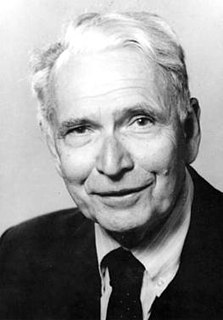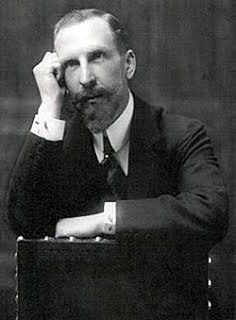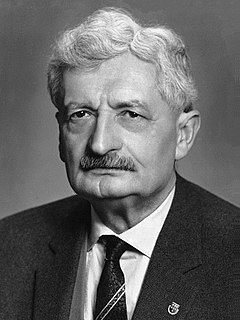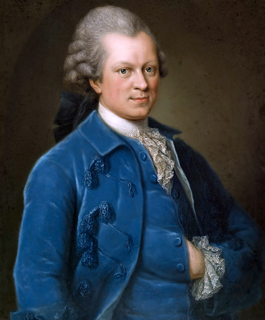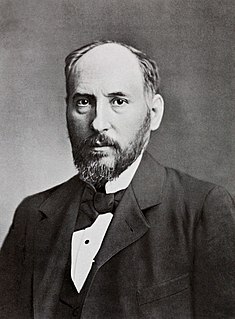Top 405 Hypothesis Quotes & Sayings - Page 6
Explore popular Hypothesis quotes.
Last updated on December 18, 2024.
New knowledge has led to the recognition in the theory of evolution of more than a hypothesis. It is indeed remarkable that this theory has been progressively accepted by researchers, following a series of discoveries in various fields of knowledge. The convergence, neither sought nor fabricated, of the results of work that was conducted independently is in itself a significant argument in favor of this theory.
Is e=mc2 a sexed equation? Perhaps it is. Let us make the hypothesis that it is insofar as it privileges the speed of light over other speeds that are vitally necessary to us. What seems to me to indicate the possible sexed nature of the equation is not directly its uses by nuclear weapons, rather it is having privileged what goes the fastest.
The most startling result of Faraday's Law is perhaps this. If we accept the hypothesis that the elementary substances are composed of atoms, we cannot avoid concluding that electricity also, positive as well as negative, is divided into definite elementary portions, which behave like atoms of electricity.
As scientists you must keep your minds open. There is no use having blind faith in Me, in Sahaja Yoga, in anything because blindness will never give you reality. But you should be open like scientists are and whatever hypothesis I am putting before you, you have to feel it on your central nervous system.
To be sure, Darwin's theory of evolution is imperfect. However, the fact that a scientific theory cannot yet render an explanation on every point should not be used as a pretext to thrust an untestable alternative hypothesis grounded in religion into the science classroom or to misrepresent well-established scientific propositions.
Mr Hooke sent, in his next letter [to Sir Isaac Newton] the whole of his Hypothesis, scil that the gravitation was reciprocall to the square of the distance: ... This is the greatest Discovery in Nature that ever was since the World's Creation. It was never so much as hinted by any man before. I wish he had writt plainer, and afforded a little more paper.
On the threshold of the moral world we meet the idea of Freedom, 'one of the weightiest concepts man has ever formed,' once a dogma, in the course of time a hypothesis, now in the eyes of many a fiction, yet we cannot do without it, even although we may be firmly convinced that our acts are determined by laws that cannot be broken.
Is evolution a theory, a system, or a hypothesis? It is much more it is a general postulate to which all theories, all hypotheses, all systems must henceforward bow and which they must satisfy in order to be thinkable and true. Evolution is a light which illuminates all facts, a trajectory which all lines of thought must follow this is what evolution is.
People often think of artists and scientists as being diametrically opposed, but we both believe something is possible. We have a hypothesis and then we do everything to make it possible, but we don't know if it's possible! All the scientists I've worked with have a natural, easy fit with me. The solutions they find are truly creative. All scientists, in some way, are artists.
There is the theory that all the living forms in the world have arisen from a single source which itself came from an inorganic form. This theory can be called the 'general theory of evolution,' and the evidence which supports this is not sufficiently strong to allow us to consider it as anything more than a working hypothesis.
No fossil is buried with its birth certificate. That, and the scarcity of fossils, means that it is effectively impossible to link fossils into chains of cause and effect in any valid way... To take a line of fossils and claim that they represent a lineage is not a scientific hypothesis that can be tested, but an assertion that carries the same validity as a bedtime story-amusing, perhaps even instructive, but not scientific.
Perhaps civilization will never be safe until we care for something else more than we care for it. The hypothesis has certain facts to support it. As far as peace (which is one ingredient in our idea of civilization)is concerned, I think many would now agree that a foreign policy dominated by desire for peace is one of the many roads that lead to war.
The degree of confirmation assigned to any given hypothesis is sensitive to properties of the entire belief system... simplicity, plausibility, and conservatism are properties that theories have in virtue of their relation to the whole structure of scientific beliefs taken collectively. A measure of conservatism or simplicity would be a metric over global properties of belief systems.
The real question is, Did God use evolution as His plan? If it could be shown that man, instead of being made in the image of God, is a development of beasts we would have to accept it, regardless of its effort, for truth is truth and must prevail. But when there is no proof we have a right to consider the effect of the acceptance of an unsupported hypothesis.
No true geologist holds by the development hypothesis;-it has been resigned to sciolists and smatterers;-and there is but one other alternative. They began to be, through the miracle of creation. From the evidence furnished by these rocks we are shut down either to belief in miracle, or to something else infinitely harder of reception, and as thoroughly unsupported by testimony as it is contrary to experience. Hume is at length answered by the severe truths of the stony science.
We do not accept a religion because it offers us certain rewards. The only thing that a religion can offer us is to be just what it, in itself, is: a greater meaning in ourselves, in our lives, and in our grasp of the nature of things...a religion exists for us only if, like a piece of poetry, it carries us away. It is not in any sense a 'hypothesis.
The results serve to disprove the tetranucleotide hypothesis. It is, however, noteworthy-whether this is more than accidental, cannot yet be said-that in all desoxypentose nucleic acids examined thus far the molar ratios of total purines to total pyrimidines, and also of adenine to thymine and of guanine to cytosine, were not far from 1.
It is not easy to convey, unless one has experienced it, the dramatic feeling of sudden enlightenment that floods the mind when the right idea finally clicks into place. One immediately sees how many previously puzzling facts are neatly explained by the new hypothesis. One could kick oneself for not having the idea earlier, it now seems so obvious. Yet before, everything was in a fog.
After a duration of a thousand years, the power of astrology broke down when, with Copernicus, Kepler, and Galileo, the progress of astronomy overthrew the false hypothesis upon which its entire structure rested, namely, the geocentric system of the universe. ... the earth revolves in space intervened to upset the complicated play of planetary influences, and the silent stars, relegated to the unfathomable depths of the sky, no longer made their prophetic voices audible to mankind.
Too much openness and you accept every notion, idea, and hypothesis-which is tantamount to knowing nothing. Too much skepticism-especially rejection of new ideas before they are adequately tested-and you're not only unpleasantly grumpy, but also closed to the advance of science. A judicious mix is what we need.
An idea can be tested, whereas if you have no idea, nothing can be tested and you don't understand anything. The molecule that you make when you are getting sunburned or when you eat a lot of food is part of the same molecule that contains an endorphin or an opiate. No one has ever had a hypothesis about why the two are together.
A lot of humanists treat religion as if it were simply a kind of rival cosmological hypothesis, and that this is all it is. My view is that to the extent that religions are cosmological hypotheses, this is not the only important thing about them, and we - atheists- will never get a proper understanding of what religion is if we focus too much on the cosmology.
And as this is the obvious appearance of things, it must be admitted, till some hypothesis be discovered, which by penetrating deeper into human nature, may prove the former affections to be nothing but modifications of the latter. All attempts of this kind have hitherto proved fruitless, and seem to have proceeded entirely from that love of simplicity which has been the source of much false reasoning in philosophy.
Successful businesses measure and count things. I think that's a safe assumption on top of which we can drop the following hypothesis: unsuccessful business either measure nothing, the wrong things, too many things, or finally, they measure the right things but they don't communicate the measurements efficiently.
For the world is an ever-elusive and ever-disappointing mirage only from the standpoint of someone standing aside from it—as if it were quite other than himself—and then trying to grasp it. But a third response is possible. Not withdrawal, not stewardship on the hypothesis of a future reward, but the fullest collaboration with the world as a harmonious system of contained conflicts—based on the realization that the only real "I" is the whole endless process.
You will reply that reality hasn't the slightest need to be of interest. And I'll answer you that reality may avoid the obligation to be interesting, but that hypotheses may not. In the hypothesis you have postulated, chance intervenes largely. Here lies a dead rabbi; I should prefer a purely rabbinical explanation; not the imaginary mischances of an imaginary robber.
An essential aspect of creativity is not being afraid to fail. Scientists made a great invention by calling their activities hypotheses and experiments. They made it permissible to fail repeatedly until in the end they got the results they wanted. In politics or government, if you made a hypothesis and it didn't work out, you had your head cut off.
Chance alone is at the source of every innovaton, of all creation in the biosphere. Pure chance, only chance, absolute but blind liberty is at the root of the prodigious edifice that is evolution... It today is the sole conceivable hypothesis, the only one that squares with observed and tested fact. Stating life began by the chance collision of particles of nucleic acid in the "prebiotic soup."
During the last two centuries and a half, physical knowledge has been gradually made to rest upon a basis which it had not before. It has become mathematical. The question now is, not whether this or that hypothesis is better or worse to the pure thought, but whether it accords with observed phenomena in those consequences which can be shown necessarily to follow from it, if it be true
According to which principle or hypothesis all the objections against the universality of Christ's death are easily solved; neither is it needful to recur to the ministry of angels, and those other miraculous means which they say God useth to manifest the doctrine and history of Christ's passion unto such, who, living in the places of the world where the outward preaching of the Gospel is unknown, have well improved the first and common grace.
But if we establish the working hypothesis that the UFOs are machines, we also have to assume the following:
a) They are not built by human beings..
b) They are flying by means of artificial fields of gravity..
c) They produce high-tension electric charges in order to push the air out of their paths, so it does not start glowing, and strong magnetic fields to influence the ionized air at higher altitudes.
It really comes down to parsimony, economy of explanation. It is possible that your car engine is driven by psychokinetic energy, but if it looks like a petrol engine, smells like a petrol engine and performs exactly as well as a petrol engine, the sensible working hypothesis is that it is a petrol engine.
Why should not every individual man have existed more than once upon this world? Why should I not come back as often as I am capable of acquiring fresh knowledge? Is this hypothesis so laughable merely because it is the oldest? Because the human understanding, before the sophistries of the schools had dissipated and debilitated it, lighted upon it at once?
All things considered, I can see no reason to adopt the afterlife hypothesis. I am sure I shall remain in a minority for a long time to come, especially among experiencers, but for me the evidence and the arguments are overwhelming ... We are biological organisms, evolved in fascinating ways for no purpose at all and with no end in mind. We are simply here and this is how it is. I have no self and "I" own nothing. There is no one to die. There is just this moment, and now this, and now this.
I, on the other hand, am a finished product. I absorb electrical energy directly and utilize it with an almost one hundred percent efficiency. I am composed of strong metal, am continuously conscious, and can stand extremes of environment easily. These are facts which, with the self-evident proposition that no being can create another being superior to itself, smashes your silly hypothesis to nothing.
In the study of this membrane [the retina] I for the first time felt my faith in Darwinism (hypothesis of natural selection) weakened, being amazed and confounded by the supreme constructive ingenuity revealed not only in the retina and in the dioptric apparatus of the vertebrates but even in the meanest insect eye. ... I felt more profoundly than in any other subject of study the shuddering sensation of the unfathomable mystery of life.
In history, in most cultures, and at most points in time, if you want to find the most advanced technologies, you can look principally in two places. One is weapons and the other is musical instruments. My hypothesis is that instruments are usually ahead of weapons. In fact, I think you can find many examples of instruments being predecessors of weapons and very few in the reverse.
Today, we cannot produce machines that fly the same as UFOs do. They are flying by means of artificial fields of Gravity. This would explain the sudden changes of directions. This hypothesis would also explain the piling-up of these discs into a cylindrical or cigar-shaped mothership upon leaving the Earth.
If you think about the impact of climate change, [it should be how] a doctor would deal with the problem. A scientific hypothesis is tested to absolute destruction, but medicine can't wait. If a doctor sees a child with a fever, he can't wait for [endless] tests. He has to act on what is there. The risk of delay is so enormous that we can't wait until we are absolutely sure the patient is dying.
His hypothesis goes to this - to make the common run of his readers fancy they can do all that can be done by genius, and to make the man of genius believe he can only do what is to be done by mechanical rules and systematic industry. This is not a very feasible scheme; nor is Sir Joshua sufficiently clear and explicit in his reasoning in support of it.
I believe in clear-cut positions. I think that the most arrogant position is this apparent, multidisciplinary modesty of "what I am saying now is not unconditional, it is just a hypothesis," and so on. It really is a most arrogant position. I think that the only way to be honest and expose yourself to criticism is to state clearly and dogmatically where you are. You must take the risk and have a position.
A biologist, if he wishes to know how many toes a cat has, does not "frame the hypothesis that the number of feline digital extremities is 4, or 5, or 6," he simply looks at a cat and counts. A social scientist prefers the more long-winded expression every time, because it gives an entirely spurious impression of scientificness to what he is doing.
The scientific method is designed to help investigators overcome the most entrenched human cognitive habit: the confirmation bias, the tendency to notice and remember evidence that confirms our beliefs or decisions, and to ignore, dismiss, or forget evidence that is discrepant. That's why we are all inclined to stick to a hypothesis we believe in. Science is one way of forcing us, kicking and screaming if necessary, to modify our views.
Anarchism is grounded in a rather definite social-psychological hypothesis: that forceful, graceful and intelligent behaviour occurs only when there is an uncoerced and direct response to the physical and social environment; that in most human affairs, more harm than good results from compulsion, top-down direction, bureaucratic planning, pre-ordained curricula, jails, conscription, states.
I abandoned the extraterrestria l hypothesis in 1967 when my own field investigations disclosed an astonishing overlap between psychic phenomena and UFOs ... The objects and apparitions do not necessarily originate on another planet and may not even exist as permanent constructions of matter. It is more likely that we see what we want to see and interpret such visions according to our contemporary beliefs.
Some of us still get all weepy when we think about the Gaia Hypothesis, the idea that earth is a big furry goddess-creature who resembles everybody's mom in that she knows what's best for us. But if you look at the historical record - Krakatoa, Mt. Vesuvius, Hurricane Charley, poison ivy, and so forth down the ages - you have to ask yourself: Whose side is she on, anyway?
Our conceptions of morality, as all our other ideas, pass through a course of development; the difficulty comes in adjusting our conduct, which has become hardened into customs and habits, to these changing moral conceptions. When this adjustment is not made, we suffer from the strain and indecision of believing one hypothesis and acting upon another.
In thermodynamics as well as in other branches of molecular physics , the laws of phenomena have to a certain extent been anticipated, and their investigation facilitated, by the aid of hypotheses as to occult molecular structures and motions with which such phenomena are assumed to be connected. The hypothesis which has answered that purpose in the case of thermodynamics, is called that of "molecular vortices," or otherwise, the "centrifugal theory of elasticity.
Contrary to Piketty’s rentier hypothesis, I don’t see anyone on the [Forbes 400 list of the wealthiest Americans] whose ancestors bought a great parcel of land in 1780 and have been accumulating family wealth by collecting rents ever since. In America, that old money is long gone - through instability, inflation, taxes, philanthropy, and spending.
All interpretations made by a scientist are hypotheses, and all hypotheses are tentative. They must forever be tested and they must be revised if found to be unsatisfactory. Hence, a change of mind in a scientist, and particularly in a great scientist, is not only not a sign of weakness but rather evidence for continuing attention to the respective problem and an ability to test the hypothesis again and again.



















